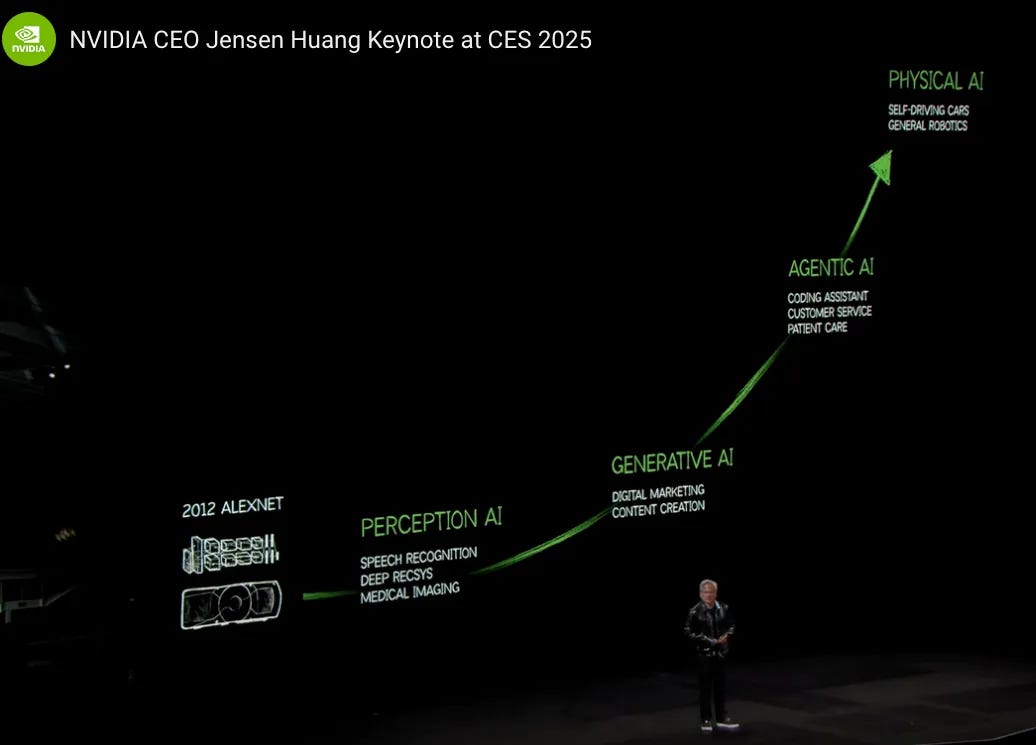The world of technology is advancing at an unprecedented pace, and at the forefront of this revolution is Agentic AI. This next-generation artificial intelligence is not just another incremental improvement—it’s a game-changing leap that promises to redefine how businesses operate, how work gets done, and how we interact with technology.
Imagine a world where technology doesn’t just assist but acts autonomously to solve problems, anticipate needs, and drive innovation. Welcome to the era of Agentic AI. Let’s explore this transformative concept, its potential, and its limitations, to understand how it can serve as a collaborative partner rather than a replacement for humans.
The Four Types of AI: A Journey from Perception to Physical AI
To understand why Agentic AI is such a breakthrough, let’s look at how AI has evolved over time:
- Perception AI: This type of AI understands images, words, and sounds. Examples include facial recognition and voice assistants like Siri or Alexa.
- Generative AI: These systems create content, such as text, images, or music. Tools like ChatGPT and DALL·E fall into this category.
- Agentic AI: This is the next step—AI that not only understands and creates but also acts autonomously to achieve goals. It’s proactive, not just reactive or creative.
- Physical AI: This is where AI interacts with the physical world, such as robots that perform tasks in healthcare, manufacturing, or even mix drinks at a bar.
As NVIDIA CEO Jensen Huang highlighted in his CES 2025 keynote, Agentic AI represents a leap forward in AI capabilities, enabling systems to operate independently and intelligently in real-world scenarios. Watch his keynote here.

What Is Agentic AI?
Agentic AI refers to artificial intelligence systems that can autonomously take actions to achieve specific goals over time, without requiring constant human intervention. Unlike traditional AI, which follows pre-programmed instructions, or generative AI, which creates content, Agentic AI goes a step further. It can perceive, reason, plan, and act independently in complex and dynamic environments.
In simpler terms, Agentic AI is like having a self-driven, intelligent assistant. You give it a task, and it figures out how to accomplish it on its own, adapting to challenges and changes along the way. OpenAI’s Operator, serves as a prime example. Operator is an AI agent that uses a web browser to complete tasks you assign to it. By navigating complex digital environments and autonomously handling multi-step processes, Operator showcases the power and versatility of autonomous, goal-oriented systems to simplify and enhance workflows across industries.
What Makes Agentic AI a Game-Changer?
Autonomy and Efficiency
Agentic AI systems can operate independently, handling tasks without constant human oversight. For example, in customer service, AI agents can resolve routine inquiries, such as tracking orders or answering FAQs, freeing up human agents to focus on more complex issues. This autonomy boosts efficiency and allows businesses to scale operations seamlessly.
Proactive Problem-Solving
Unlike traditional AI, which reacts to inputs, Agentic AI can anticipate needs and take proactive steps. In supply chain management, for instance, it can predict delays caused by weather or logistics issues and reroute shipments in real time. This capability minimizes disruptions and ensures smoother operations.
Cost Savings and Scalability
By automating repetitive tasks, Agentic AI reduces operational costs and enables businesses to scale without proportionally increasing their workforce. For example, in healthcare, AI agents can manage appointment scheduling and patient follow-ups, allowing medical staff to focus on patient care. This scalability is particularly valuable for growing businesses.
Challenges and Limitations of Agentic AI
Complex Decision-Making Requires Human Oversight
While Agentic AI excels at handling routine tasks, it struggles with nuanced decisions that require human judgment. For example, if an AI agent is booking a flight and the preferred time is unavailable, it should check with the user before selecting an alternative. This ensures that human preferences and priorities are respected.
Handling Multi-Faceted Customer Interactions
Agentic AI can face challenges in customer service scenarios requiring a blend of technical knowledge and emotional intelligence. For instance, resolving a frustrated customer’s issue about a billing error may require not just accurate data but also empathy. In such cases, the AI can assist with factual details, but human representatives are often necessary to build rapport and ensure customer satisfaction.
Managing Dynamic Workflows in High-Stakes Environments
In industries like finance or healthcare, tasks often evolve rapidly and require precise decision-making. For example, an AI system might suggest stock trades based on real-time market data, but human oversight is needed to assess the broader financial strategy and mitigate risks. Similarly, in healthcare, an AI agent might flag critical lab results, but a doctor’s judgment is crucial for accurate diagnosis and treatment.
Agentic AI as a Collaborative Partner
Rather than replacing humans, Agentic AI is best viewed as a collaborative partner—a trusted ally that handles repetitive tasks, provides insights, and supports decision-making. For example:
- In project management: AI agents can track deadlines, allocate resources, and send reminders, but project managers must make strategic decisions and resolve conflicts.
- In finance: AI can analyze market trends and generate reports, but financial advisors must interpret the data and provide personalized recommendations to clients.
This collaborative approach ensures that AI enhances human capabilities without overstepping its boundaries, creating a synergy that drives productivity and innovation.
The Road Ahead
Agentic AI is poised to redefine how we interact with technology and the world around us. By fostering a partnership between humans and AI, we can unlock unprecedented levels of productivity and innovation. The future isn’t just automated—it’s collaborative. Balancing AI’s strengths with human oversight is the key to unlocking its full potential and ensuring that critical decisions remain in human hands.
At Rockrose Executive Search, we’re committed to helping businesses navigate this transformative era. We connect you with the leaders and innovators shaping the future of technology, ensuring you stay ahead in a rapidly evolving landscape. AI is at the heart of what we do, and we’re here to empower your organization to harness its potential—today and tomorrow.